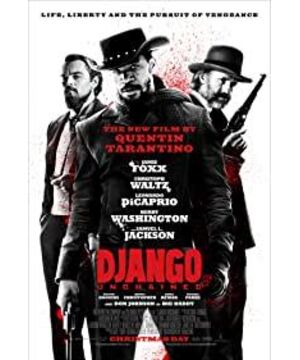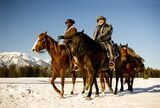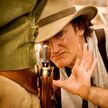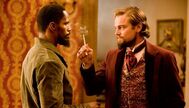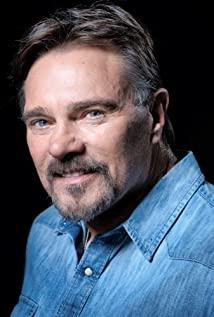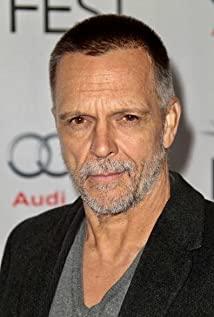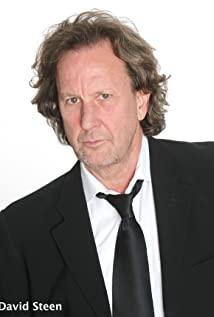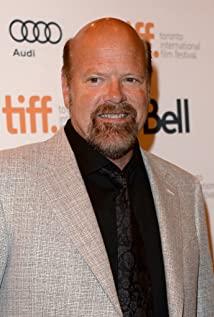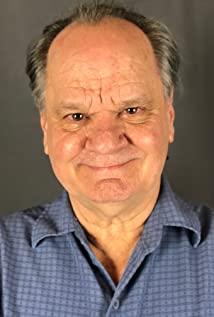Movie · Foreword
I don't have a deep understanding of Quentin. It's only because of the unique evaluation of him by the Internet media that he left a little bit of a place in my memory. Even if I was fortunate enough to have seen his famous work "Pulp Fiction", I couldn't make a deep impression on him (in fact, I didn't understand this movie very well at the time).
After watching "Django Unchained" last night, I understood a little about Quentin's tension in film art.
"Django Unchained" is not a deep connotation movie. Its main feature is that it is funny enough, and it is a black humor movie that is extremely absurd.
But from the overall point of view, the plot of this movie is quite complete, and the connection between the various plots will not make people feel inconsistent. It will affect the viewing experience, but because of the deliberate lack of these logics, people are amazed: it turns out that the movie can really be shot like this.
This is my first impression of Quentin after watching the movie "Django Unchained".
But in this film review, what I want to talk about most is the portrayal of the characters.
Schultz is not a gentleman, let alone a justice enforcer
Let's talk about Schultz first. This character should be the one with the biggest emotional cognition difference between me and the audience. Please allow me to ask a question: Do you think Schultz is a good person?
Everyone can give their own opinions directly. Next, I will start from the plot of the film and give my own ideas. After watching it, you may change your view of this character a little.
A friend told me this: Schultz is a staunch enforcer of justice, and his words and deeds are strictly in accordance with the law and order. Calvin was killed out of desperation for the law.
I have another interpretation of this. The director may never have intended to set Schultz as a person with a sense of justice, because there are not many details in the film to support this. On the contrary, at the beginning of the story, the two white men who were shot for refusing to sell Django to him gave me a bigger impression. I wonder if the two white men on horseback broke any laws? You must know that enslaving black people was not a sinful thing at the time.
Regarding this tragic incident, the film is also very straightforward: Schultz's actions were mainly driven by interests, and the white man threatened to drive him away with a gun was also a necessary self-protection measure because of Schultz's offense. Yes, because it was late at night, and in such an environment as the wilderness, who could guarantee that the horses and slaves he had finally bought would not be robbed? But in the end, they still died tragically under the guns of Schultz and the black slaves, and the fuse of this tragedy was not to rescue the black slaves, but a business dispute in essence.
He's buying Django because he needs to use Django to get things done. Thinking about it this way, I really don't see how much sense of justice Schultz has. The reason why the audience has a good impression of Schultz is because of the angle of the film's narrative.
As for the reason why Schultz gave up the decent profession of dentistry, there is not enough explanation in the film. On the whole, it is not important for the overall plot direction of the film. This setting is not meant to explain anything, but more for the plot. Expand and serve.
Regarding the character of Schultz, three characteristics can be extracted from the film:
One is that he seems to be a loyal supporter of the Negro slaves.
But if you analyze it rationally, you won't feel how much Schultz likes black people. At most, it can only show that he has his own strong opinion (this can be seen from the fact that he would rather die than shake hands with Calvin), no He is full of prejudice against black people due to mainstream ideas, and he later treats Django better because of the companionship derived from birth and death.
There is a plot in the film: When Schultz accompanied Calvin to the manor, he saw a black slave who was trying to escape and was caught by the guards. For the purpose of killing chickens and monkeys, he was about to be bitten by dogs. under the opponent.
At the time, everyone was horrified by this, and Django stopped him sternly, so he quickly changed his mind again. As we have emphasized earlier, Schultz is a person with strong opinions, and being able to make a person full of opinions change his mind so easily can only show that he did not intend to save the other party, but more because he could not adapt to such a situation. Instinct action taken in response to the scene.
Recalling that when Schultz first brought Django, he told Django that he despised slavery, and he couldn't see any emotion in his eyes. It seemed that he said this mainly to appease Django. He was different from other white people. Without any malice, let Django cooperate with him to complete the bounty task. From Schultz's attitude towards the newly bought Django, we can see that Schultz does despise slavery, but it is only contempt, not equal to hatred, nor does it mean that he will fight slavery to the end, much less right How insistent the justice is, he is more like he doesn't care.
Schultz was not espousing black slaves, but the fundamental right of a man to die as a human being.
The second is the means by which Schultz achieves his end.
After Schultz discovered that Django's wife was in Calvin's hands, he could have spent a lot of money to buy Django's wife directly, but he had to go around such a big detour and lied to Calvin that he wanted to do business with him—— When the negotiation was about to become a foregone conclusion, he said that he wanted to take Django's wife Brumhida by the way.
Schultz's own explanation for this action in the film is that Calvin may not agree to betray Blumhilda, but this argument is clearly untenable. Because Brumhida's face was marked for running away, and it was not suitable for housework, it was not worth much.
So here comes the question: Since Broomhida is not worth a lot of money, why is Schultz so sure that Calvin is willing to sell his precious "fighting black slave", but he is not willing to exchange it for a worthless female black slave An exciting price? You must know that Calvin is a businessman in essence, and the businessman cares most about the profit. As long as you bid high enough, there is nothing he can't buy. In fact, when Schultz's scheme was discovered, Calvin also offered to ask Schultz to spend 12,000 yuan to buy Broomhida.
The only explanation I can think of is this: Schultz wasn't willing to buy or sell.
For a rich man like Calvin, he would not pay attention to a small transaction, so to buy Broomhida, it must be an outrageous price that is almost equivalent to giving Calvin free money.
But if this is the case, Calvin is very happy, but Schultz is not very happy, because although he is good to Django, it does not mean that he will also be so good to Broomhida, really want to trade like this , he most likely has to pay for it, he doesn't want to suffer this loss.
If an outrageous price can be exchanged for Broomhida, and at the same time, it can be exchanged for something of real value, it is not too bad from the transaction, but Schultz obviously does not want to trade well, because " "Fighting Black Slaves" doesn't do much for him, because he doesn't have any business resources about "Fighting Black Slaves", and he can't resell it for a little money after buying it. Besides, he has no interest in black slave trading. So in the end, after finalizing the deal with Calvin, he clearly had enough cash on his body, but he still thought about delaying the delivery, indicating that he was essentially thinking of "white wolf with empty gloves" and wanted to give Calvin a set. This reflects Schultz's cunning side as a businessman.
As far as Schultz's purpose and motivation are concerned, let's go back to the beginning of the film, because he insisted on getting Django to achieve his goal and did not hesitate to kill the two horsemen. The personality of achieving ends without resorting to means.
Therefore, it is more convincing to take risks than to say that Schultz gave up being a dentist in order to enforce justice.
The third is Schultz's gentleman's dignity.
There is a scene in the film that impressed the audience: when Calvin forced Schultz to shake hands, Schultz could have complied with his wish, and then stepped out of Calvin's manor generously, but He would rather choose to kill Calvin than to choose to die here.
Why on earth did Schultz do this?
In this regard, we can fully analyze the details of the plot.
The story scene at the time was: After Schultz was forced to close the deal under the threat of Calvin, Schultz was furious and childishly remarked: Usually I say goodbye to people, but only to you, me Will say "Farewell".
And Calvin was in a good mood, but was provoked by Schultz's words, so there was a follow-up in which Calvin would rather not make the money and shake hands with Schultz. From this plot alone, we can extract at least three pieces of information:
The first point is that Schultz is very assertive;
The second point is that Calvin loves money very much and has a lot of self-esteem;
As for the third point, Schultz is more cunning, but lacks the scheming and tact of a businessman. In short, he is not good at hiding his true emotions.
This can also be fully confirmed by Schultz's plan to buy escaped slaves because they couldn't adapt to the scene of people being bitten by dogs on their way to the manor with Calvin.
You must know that Schultz is playing a businessman who sells "gladiator black slaves". Since he has such an identity, he is naturally accustomed to such inhuman scenes. Such a reaction is outrageous. Schultz is too bad at disguising and acting.
On the contrary, Django pretended to be calm, and while successfully deceiving Calvin, he also helped Schultz and taught him a lesson: the life of a black slave is nothing to the slave owner, it is cheaper than a toy, He knows this much better than Schultz. If you take black slaves too much, don't even think about completing this mission.
Schultz does not have the concept of racial discrimination, but this does not mean that he is a gentleman. At most, he just has his own gentleman's principles: people can be shot to death, they can die on the battlefield, but they cannot die in such a humiliating way. .
After analyzing this, Schultz’s motive for shooting Calvin just to avoid shaking hands is not difficult to understand: on the one hand, Schultz thinks Calvin is very low, so ignorant that he doesn’t even understand that the Dumas he admires is actually Also of black ancestry. Such a low-level person, far from being on the same level as someone on the same level, is not worthy to associate with him on an equal footing; on the other hand, Schultz does not understand disguise, is unwilling to forbear, and fights to the end for self-esteem.
As for Calvin, I have read that some people have analyzed that Schultz is unwilling to shake hands because he is unwilling to admit slavery. I would like to emphasize Calvin's identity as a businessman again.
What a businessman cares about most is his interests. As for what others stand for, whether he is an opponent or a defender of slavery, as long as his interests are not substantively violated, what does it have to do with him?
So the most appropriate explanation is that Calvin insisted on shaking hands with Schultz because Schultz had offended him. Since you are so arrogant, and you have to think that you are a civilized person higher than me, then I have to shake hands with you. Isn't the purpose of all your troubles being for Django's wife? I want to see that it is Django. Your wife is more important or your dead skin is more important, I just want to hit you in the face.
Isn't this setting more in line with everyone's perception of Quentin: bold, arrogant, simple and rude.
Having said that, Schultz's portrait is very clear: he despises slavery, is bold and cunning, does not compromise on means to achieve his goals, but has his own set of gentleman's principles, and puts this gentleman's principles on a very high level In his position, all the purpose must give way to this gentleman's principle, even if it is his own life.
In a way, Calvin is also a victim
When interpreting Schultz, I also talked about some of Calvin's characters, so we will continue to explain this role while the iron is hot.
If it is purely from the role of positioning, Calvin seems to be the villain, but if combined with history, Calvin may not be as bad as you think.
Of course, this does not mean that Calvin is a good person, the problem depends on what perspective you take, because the definition of justice is not static, it has historical limitations, and will change with the changes in the mainstream concept of history .
For example, insulting others, especially parents and officials, is a very bad behavior, but it is not included in the criminal law, and most of the time it is not equated with the words "evil" and "devil". If it was in the Tang Dynasty, it could be executed, and this strict law was justice at that time.
The same is true in the United States of that era. Black slaves were not regarded as human beings, but were the goods of plantation owners like pigs, sheep and other livestock. No matter how the owner handles his own goods, it is not excessive. This principle is the same as slaughtering cattle and sheep today. Although it is cruel, it is not unjust. Maybe at some point in the future, we will be regarded as not saying hello when we meet people. Injustice, this is the connection between justice and history.
Knowing this, if you go to the movies again, you won't feel that there is any problem with Calvin, because he is indeed dealing with his own property, it just happens that this "property" of Calvin is of great significance to the protagonist. After all, It's also a matter of the narrative point of view of the film.
Therefore, objectively speaking, Calvin died quite innocently (again, it is from a historical point of view). From the plot that the film explained to us, Calvin did not commit any crimes, but he was almost killed by Schultz and Django He was deceived, and later saw through the trap of the two under the prompt of the housekeeper, and finally regained a little face, but he was mocked and despised by Schultz, which hurt his self-esteem. In the end, he wanted to restore his self-esteem by shaking hands with Schultz, but he died unexpectedly and tragically under Schultz's gun. If he was judged by his subjective thoughts at that time, Calvin could be said to not understand until he died. What exactly is going on.
As for Calvin's command of his men to threaten Schultz and Django with guns in the film, the purpose is very simple, to protect his own personal and property safety. If Schultz refuses to pay the money, he will follow his promise. Killing Django's wife, even though it's his disposal of his property, doesn't know what these two crazy liars will do.
If Schultz refuses to buy, Calvin will shoot Django's wife, but will not attack Schultz and them unless the other side threatens his life. Schultz has his own gentleman's principles, Calvin has businessman's principles, but in contrast, Calvin is actually more of a law-abiding citizen than Schultz, because as a viewer, I only see Schultz committing crimes in the film , without seeing Calvin committing a crime.
Does this analysis make it seem that Calvin is not so bad?
The old butler is the real villain
There is one scene in the film that left a deep impression on me: when I saw Django riding a horse, the white guards spread out side by side to welcome slowly towards the manor, the old black butler's eyes were first happy, then amazed, confused, In the end, it turned into anger, and the transformation of inner emotions was real and wonderful, showing the character of this character vividly.
The old black housekeeper is undoubtedly the most loyal defender of slavery. Although he is also black, this does not prevent him from feeling that he has a white heart. In fact, his status and authority in the manor is indeed much higher than that of ordinary black slaves.
The reason why the old butler supports slavery is also very simple. Because of the existence of this system, he has so many people at his disposal, which sets him off very tall, which also proves that the old butler also has favoritism. Arrogant personality, for example, when he saw Django, a black man on horseback for the first time, his values almost collapsed: even I have never ridden a horse, why is he a black man on a horse, this is not to show his status taller than me? No, I don't allow this to happen.
The performance of the old housekeeper in the film is also very interesting. When he saw his master Calvin, he did not greet him, because his attention was all on the thought of "why is this black man riding a horse", Instead, Calvin took the initiative to greet him. As a black man, he should have been full of honor for this, but he didn't appreciate it very much, replied "what a shit", and then rudely asked his master: Who is the black man on this horse?
Even the joke behind him was very rude, and then he pointed at Django, showing that he was so jealous that Django was treated by his master to the point of resentment. This feeling is like a well-loved dog. When he sees that his owner is kind to another, he can't wait to rush over and kill the "wild dog" immediately.
Later, at the dinner party, the old butler was very concerned that Django could sit at the table like a white man, so he expressed himself very carefully, and whenever the host Calvin joked, the old butler was afraid that no one would know that he could get the joke. Like, he laughed the most exaggeratedly, as if he belonged to this circle.
These performances of his are actually for Django to see. He is secretly competing with Django, wanting to show Django that his status is no worse than him, so when Calvin's sister reminded Broomhida to keep staring at Django While watching, the housekeeper firmly held on to this matter. After a while of suspicion, he was immediately excited and grabbed Brumhida into the back room to question him.
He is also black, but the old butler is the most vicious to Django. He is the least likely to see that his own kind can enjoy all this. On the surface, the old butler is betraying his own race, but in fact he is overly sensitive to his own rights, because It is precisely because of the existence of slavery that he occupies the top position in the entire black group. This type of person often knows how to oppress his own kind better than the white oppressor.
Whether it is analyzed from the character setting or the plot, the old housekeeper is the biggest villain. His existence directly leads to the two most critical reversals in the plot, and his death is the last position in the villain.
to the end
The above is the author Xiao Xu's entire analysis of the film. I thought it would end soon, but I wrote and wrote more than 5,000 words without realizing it. In fact, there are many parts that can be omitted, but I am worried that the explanation is not enough. It is sufficient to cause readers to misunderstand what I mean, so I have to add the reasons for each analysis.
Finally, I'm very glad that readers have affirmed Xiao Xu's two comic works, "The Pet Girl of Sakura Village" and "Youth with a Pig Head Wouldn't Dream of a Bunny Girl". I will add them to the follow-up comics in the near future. Complete, I'm really sorry for not updating for so long.
This article comes from the public account: An Ruo Xiaoxu
View more about Django Unchained reviews


